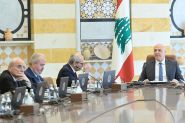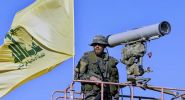
A series of Israeli airstrikes across southern and eastern Lebanon since Thursday, has turned it into one of the deadliest escalations in weeks. The latest attacks on Sunday targeted two senior Hezbollah figures in Naqoura and the Beqaa Valley, as Israeli Defense Minister Israel Katz toured the northern border alongside U.S Envoy to the Middle East Morgan Ortagus.
According to the Israel army spokesperson, Avichay Adraee, the first strike near Naqoura on Sunday killed Abdel Mahmoud al-Sayyed, described as Hezbollah’s local representative in the nearby village of Bayada. Al-Sayyed reportedly managed relations between the group and local residents “on economic and military matters,” and was involved in efforts to rebuild Hezbollah’s military infrastructure in the area.
A second strike, also on Sunday, in Nabi Chit in the Beqaa Valley, killed Ali Hussein al-Moussawi, a Hezbollah weapons smuggler accused by the Israeli army of overseeing the transfer of arms from Syria to Lebanon. The Israeli military said al-Moussawi played “a significant role in the reestablishment and strengthening” of Hezbollah’s capabilities.
Later in the day, additional Israeli drone attacks struck targets near Baalbeck, Bouday, and el-Hafir, killing at least two more people – one of them identified as a Syrian national- and bringing the total number of deaths from Israeli operations in Lebanon since Thursday to twelve.
Since the ceasefire, and according to Israeli media, the Israeli army claims to have killed over 330 Hezbollah operatives, struck hundreds of sites, and conducted more than 1,000 operations in southern Lebanon.
UN Peacekeepers Shoot Down Israeli Drone
In a rare development, the UN Interim Force in Lebanon (UNIFIL) confirmed that peacekeepers shot down an Israeli drone near Kfar Kila after it reportedly acted “aggressively” toward their patrol. UNIFIL said further details would be provided in an upcoming statement.
The Israeli military on Monday accused UN peacekeepers in southern Lebanon of shooting down one of its drones a day earlier during an intelligence-gathering mission.
"Yesterday, an IDF intelligence-gathering drone was downed in the area of Kfar Kila in southern Lebanon during a routine intelligence-gathering activity in the area," military spokesman Lieutenant Colonel Nadav Shoshani said on X.
"An initial inquiry suggests that UNIFIL forces stationed nearby deliberately fired at the drone and downed it. The drone's activity did not pose a threat to UNIFIL forces."
Following the shooting of the drone, the military dropped a grenade toward the area where the UAV fell, adding that troops did not fire at the peacekeepers.
On Sunday, UNIFIL said an Israeli drone flew over its patrol in an "aggressive manner".
"The peacekeepers applied necessary defensive countermeasures to neutralise the drone," it said in a statement.
The incident "shows disregard for safety and security of the peackeepers implementing Security Council mandated tasks in southern Lebanon", it said.
UNIFIL later said another Israeli drone came close to its patrol operating near Kfar Kila and dropped a grenade.
"Moments later, an Israeli tank fired a shot towards the peacekeepers. Fortunately, no injury or damage was caused to the UNIFIL peacekeepers and assets," the statement added.
Katz and Ortagus Tour Border, Reaffirm U.S.-Israel Coordination
The strikes coincided with a high-level tour of Israel’s northern border by Defense Minister Katz and U.S. envoy Morgan Ortagus, joined by U.S. Ambassador Mike Huckabee, Israeli Ambassador to Washington Yechiel Leiter, and Northern Command chief Maj. Gen. Rafi Milo. According to Israeli media, the group received briefings on Hezbollah’s recent activities and Israel’s security operations following the November 2024 ceasefire.
During the visit, Katz vowed that Israel would “continue to defend its northern regions against any threat,” stressing that the IDF would act “at our discretion” to neutralize hostile activity.
Ortagus is expected to travel to Lebanon on Monday for meetings with officials in Beirut, where she will remain until Wednesday, according to Lebanese broadcaster MTV. She is also expected to attend a meeting of the ceasefire monitoring mechanism. Her trip follows growing U.S. pressure on both sides to preserve the fragile ceasefire and support the Lebanese army’s plan to extend its control over the south.
Netanyahu: ‘No Need for a Green Light’
Amid international concern over the intensifying strikes, Israeli Prime Minister Benjamin Netanyahu reiterated that Israel would continue targeting what he called the country’s “enemies” in both Lebanon and Gaza, asserting that “Israel is an independent state” that does not require external approval for its actions.
“Our security policy is in our own hands,” Netanyahu said during a cabinet meeting Sunday. “We respond at our discretion to attacks – as we’ve seen in Lebanon and recently in Gaza.”



Comments